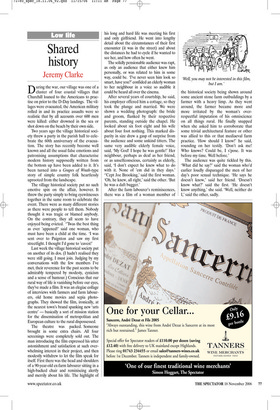Shared history
Jeremy Clarke
During the war, our village was one of a cluster of four coastal villages that Churchill loaned to the Americans to practise on prior to the D-Day landings. The villages were evacuated, the American military rolled in and its practice assaults were so realistic that by all accounts over 600 men were killed: either drowned in the sea or shot down on the beach by their own side.
Two years ago the village historical society threw a party in the parish hall to celebrate the 60th anniversary of the evacuation. The story has recently become well known and all the usual false emotions and patronising assumptions that characterise modern history supposedly written from the bottom up have been added to it. It’s been turned into a Grapes of Wrath-type story of simple country folk heartlessly uprooted from the landscape.
The village historical society put no such emotive spin on the affair, however. It threw the party simply to bring eyewitnesses together in the same room to celebrate the event. There were as many different stories as there were people to tell them. Nobody thought it was tragic or blamed anybody. On the contrary, they all seem to have enjoyed being evicted. ‘’Twas the best thing as ever ’appened!’ said one woman, who must have been a child at the time. ‘I was sent over to Paignton and saw my first streetlight. I thought I’d gone to ’eaven!’ Last week the village historical society put on another of its dos. (I hadn’t realised they were still going. I must join. Judging by my conversations with the few members I’ve met, their reverence for the past seems to be admirably tempered by modesty, cynicism and a sense of humour.) Conscious that our rural way of life is vanishing before our eyes, they’ve made a film. It was an elegiac collage of interviews with farmers and farm labourers, old home movies and sepia photographs. They showed the film, ironically, at the nearest town’s brand spanking new ‘arts centre’ — basically a sort of mission station for the dissemination of metropolitan and European culture to the rural dispossessed.
The theatre was packed. Someone brought in some extra chairs. All four screenings were completely sold out. The man introducing the film expressed his utter astonishment and satisfaction at such overwhelming interest in their project, and then modestly withdrew to let the film speak for itself. First there was the head and shoulders of a 90-year-old ex-farm labourer sitting in a high-backed chair and reminiscing alertly and merrily about his life. The highlight of his long and hard life was meeting his first and only girlfriend. He went into lengthy detail about the circumstances of their first encounter (it was in the street) and about the distances he had to cycle if he wanted to see her, and how often he went.
The solidly pensionable audience was rapt, as only an audience that either knew him personally, or was related to him in some way, could be. ‘I’ve never seen him look so smart, have you?’ confided an elderly woman to her neighbour in a voice so audible it could be heard all over the cinema.
After several years of courtship, he said, his employer offered him a cottage, so they took the plunge and married. We were shown a wedding photograph: the bride and groom, flanked by their respective parents, standing outside the chapel. He looked about six foot eight and his wife about four foot nothing. This marked disparity in size drew a gasp of surprise from the audience and some unkind titters. The same very audible elderly female voice, said, ‘My God! I hope he was gentle!’ Her neighbour, perhaps as deaf as her friend, or as unselfconscious, certainly as elderly, said, ‘I don’t expect he knew what to do with it. None of ’em did in they days.’ ‘’Cept Joe Brooking,’ said the first woman. ‘Oh, he knew, all right,’ said the other. ‘But he was a daft bugger.’ After the farm labourer’s reminiscences, there was a film of a woman member of the historical society being shown around some ancient stone farm outbuildings by a farmer with a heavy limp. As they went around, the farmer became more and more irritated by the woman’s overrespectful imputation of his omniscience on all things rural. He finally snapped when she asked him to corroborate that some trivial architectural feature or other was allied to this or that mediaeval farm practice. ‘How should I know!’ he said, rounding on her testily. ‘Don’t ask me! Who knows? Could be, I s’pose. It was before my time. Well before.’ The audience was quite tickled by this. ‘What did he say?’ said the woman who’d earlier loudly disparaged the men of her day’s poor sexual technique. ‘He says he doesn’t know,’ said her friend. ‘Doesn’t know what?’ said the first. ‘He doesn’t know anything,’ she said. ‘Well, neither do I,’ said the other, sadly.


































































































 Previous page
Previous page